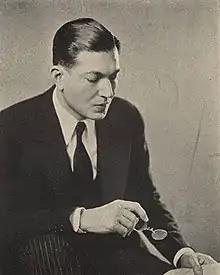Syud Hossain
Syud Hossain (23 June 1888 – 26 February 1949)[1][2] was an Indian journalist, an Indian independence activist, and the first Indian ambassador to Egypt in the Jawaharlal Nehru administration.[3][4]
Syud Hossain | |
|---|---|
সাইদ হোসেন | |
 | |
| Born | 23 June 1888 |
| Died | 26 February 1949 (aged 61) Cairo, Egypt |
| Burial place | Cairo |
| Nationality | Indian |
| Parent |
|
| Relatives |
|
Early life
Syud Hossain was born in Calcutta in the then Bengal Presidency, British India in 1888.[5] His father, Nawab Syud Mahomed Khan Bahadur (1850–1915), was the Inspector-General of Registration, Bengal.[6] His great-great-grandfather was Mir Ashraf Ali Khan (d. 1829).[1] Syud Hossain's mother was the daughter of Nawab Abdul Latif, a social reformer of Bengal.[5] Sher-e-Bangla A. K. Fazlul Huq (1873–1962) and Sir Hassan Suhrawardy (1888–1946), were his brother-in-laws.[1]
Hossain passed his Entrance Examination in 1904 and F.A. in 1906 from the Muhammadan Anglo-Oriental College of Aligarh. He then joined the Bengal Civil Service as a Sub-Deputy Collector in Calcutta but he soon went to England to pursue further education in 1909.[1][5]
Career
Hossain started his journalism career early in life and became the editor of Motilal Nehru's nationalist newspaper, The Independent.[7]
Hossain wrote "Echoes from Old Dacca", published in May 1909 and "Gandhi: The Saint as Statesman" in 1937.[6][8][9]
Hossain represented India at the Paris Peace Conference in 1920 for the Near Eastern Peace settlement.[9]
In the 1930s, he moved to California.[1] He served as a lecturer at the University of Southern California's Department of History as a visiting faculty lecturer. He taught two courses entitled "India's Civilization" and "Islamic Civilization" in the summer of 1934.[10] The university later conferred on him an honorary doctorate degree.[1]
When Hossain left the United States for India in 1946, a farewell dinner was organized for him at the Ceylon India Inn in New York City where the guests included Ragini Devi, Habib Rahman, and Indrani Rahman.[11]
References
- Khan, Waqar A. (2020-08-10). "An Indefatigable Crusader: Dr Syud Hossain". The Daily Star. Retrieved 2022-06-18.
- Murshed, Syud Marghub (2021-06-05). "The Tale of a Forgotten Ambassador: A rediscovery of the life of a patriot". The Daily Star. Retrieved 2022-06-17.
- "Embassy of India, Cairo, Egypt : List of former Ambassadors". www.eoicairo.gov.in. Retrieved 2022-06-17.
- Vinodh, N. S. (2020-12-29). A Forgotten Ambassador in Cairo: The Life and Times of Syud Hossain. Simon and Schuster. ISBN 978-81-947520-9-7.
- Choudhury, Enam Ahmed (2021-10-04). "Syud Hossain and his times". The Daily Star. Retrieved 2022-06-17.
- Hossain, Syud (1909). Echoes from Old Dacca. Edinburgh Press.
- "Syud Hossain: A forgotten ambassador brought back to life". South Asia Monitor. Retrieved 2022-06-17.
- Hossain, Syud (1937). Gandhi: The Saint as Statesman. Suttonhouse, Limited.
- "Pamphlet for Lectures by Dr. Syud Hossain". South Asian American Digital Archive (SAADA). 2016-09-05. Retrieved 2022-06-18.
- "Syud Hossain Pamphlet". South Asian American Digital Archive (SAADA). 2015-07-23. Retrieved 2022-06-18.
- "The Resurrection Of a Forgotten Ambassador". Valley of Words. 2021-08-04. Retrieved 2022-06-18.